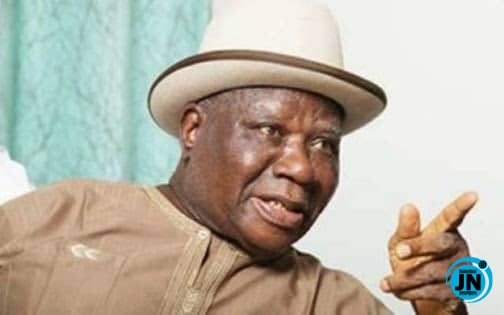Edwin Clark, a prominent Nigerian elder statesman, has called for the immediate suspension of the Nigerian Governors Forum (NGF), accusing the group of deviating significantly from its founding objectives. In a strongly-worded open letter dated January 13, 2025, Clark described the NGF as a “notorious cabal” that prioritizes political power and personal interests over public service and good governance.
Clark criticized the Forum for what he described as a betrayal of its original purpose. He explained that the NGF, which was established as a noble platform to foster inter-state cooperation and bridge the gap between various tiers of government, has now become a body that manipulates legislative processes, challenges federal executive authority, and undermines the autonomy of local governments. These actions, according to Clark, have weakened the democratic structures meant to ensure accountability and effective governance.

In his letter, Clark accused state governors of turning their respective state assemblies into mere extensions of the executive arm, thereby stifling independent legislative action. He further lambasted the governors for treating the Senate as a “retirement plan,” using their political influence to secure positions for personal gain rather than fostering a chamber of independent thought that serves the nation.
“The NGF was created to bridge the gap between tiers of government, but it has instead become a force that erodes legislative independence,” Clark wrote. He expressed disappointment at the Forum’s transformation, highlighting how its potential to unify governors under a common banner has been misused to consolidate executive power at the expense of democratic governance.
Reflecting on the NGF’s inception, Clark reminded Nigerians that the Forum was initially established to promote dialogue and cooperation among the 36 state governors. Its intended mission was to create a platform for states to collaborate on shared issues, improve governance, and work in harmony with the federal government. However, he lamented that this noble vision has been replaced with self-serving agendas that undermine constitutional order and diminish the independence of other branches of government.
Clark highlighted several specific concerns regarding the NGF’s operations. He accused the Forum of playing a key role in weakening the independence of state legislatures by consolidating excessive power within the executive arm. He also criticized the group for fostering a political culture that prioritizes personal ambition over the welfare of the Nigerian people.
Despite his strong criticism, Clark expressed hope that the NGF could undergo meaningful reforms. He acknowledged that many critics now see the Forum as a “notorious cabal,” but he maintained that with genuine changes and a renewed commitment to its founding principles, the NGF could still become “a force for good” in Nigerian governance. He called on state governors to reflect on their roles and responsibilities, urging them to work towards restoring the Forum’s credibility and purpose.
Clark’s comments have sparked a broader conversation about the role of the Nigerian Governors Forum in the country’s political landscape, with many Nigerians calling for accountability and transparency in its activities. His letter serves as a wake-up call to the NGF to address its shortcomings and recommit to serving the Nigerian people effectively.

